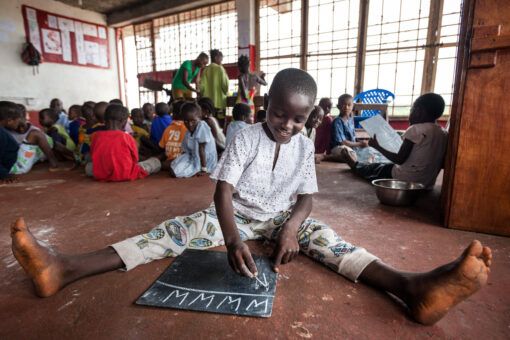
Photo credit: EducAid Sierra Leone
Aashti Zaidi Hai, CEO at Global Schools Forum (GSF), reflects on her organisation’s journey to independence, as the latest Ark Venture to successfully spin out of the Ark incubator.
GSF works to strengthen global education through supporting non-state organisations. Its 64 members operate across 51 countries in Africa, Asia and South America, running or supporting 30,000 schools, and providing five million children with access to education.
Global Schools Forum’s journey
Aashti explains, “Since GSF was formally launched as a membership organisation in 2017, we have experienced rapid growth, built a tight-knit community of members, secured multi-year funding, and established our reputation as the go-to organisation for non-state education.

GSF – Aashti
“From our origins as an annual in-person gathering of school leaders, we now support schools in three main ways. We provide opportunities for our community to collaborate and learn from one another through an annual programme of events and training and connecting members with each other and partners. We represent the voice of our members and the wider non-state sector in global education policy processes, and we support members to develop, test and scale education innovations through providing funding and technical assistance.
“During the pandemic, the value that networks such as GSF can play has been made clear. We swung into action in early 2020 to support our members as they dealt with the range of complex challenges emerging from near-universal school closures – organising webinars to share information and allow discussion on key issues such as child safeguarding, delivering instruction remotely in low-resource settings and virtual professional development. We also supported the CEOs and leaders of member organisations, convening them to troubleshoot and support each other through the crisis.”
Spinning out to independence
At the beginning of October 2021, GSF spun out of Ark and became an independent registered charity.
Aashti says, “This was an important milestone for GSF, recognising that we have reached a point where we can sustain ourselves and thrive as an independent entity.”
The spin-out of GSF is just the latest example of Ark’s success in incubating and scaling ventures that create systemic change in education.
Aashti adds, “Ark’s financial support has been catalytic – helping to unlock additional financial support from new funders. We have also benefited from sharing critical back-office functions with Ark, including Finance, IT, HR, payroll, and office space, allowing our small team to focus more of their time on our core activities. Crucially, the Ark Ventures team have also provided a key source of operational and strategic support – as well as visibility and access to networks – as we have grown and developed. I want to thank Ark for all their support in incubating and helping to grow GSF: we would not have been able to get to this point without them.”

Photo credit: Christel House
The mission to support non-state schools is more important than ever
Across many low-and-middle-income countries, GSF sees that education is in crisis. Too many children are not learning, with nearly 90% of 10-year-olds in Sub-Saharan Africa not able to read functionally. The Covid-19 pandemic has worsened this situation, with more than 28 million children at risk of not returning to school. Yet, in 2022, international aid to education is expected to fall by at least 12%.
Across the world, “non-state” schools – including schools run by NGO’s, community schools, and low-cost private schools – have stepped up to help fill some of the gaps in education provision. These schools now account for a significant amount of global education. Before the Covid-19 pandemic, around 1 in 5 primary school children, and 1 in 4 secondary school children, were educated in the sector, often including those from the very poorest communities.
The road ahead for GSF
Looking forward, GSF is excited to be exploring new directions, including the launch of Learning Labs, a new programme that will see them support and fund their member organisations to test, evaluate and scale educational innovations.
Aashti continues, “We are thinking about how we can support our members to work more effectively and systematically with governments. We will test the viability of establishing regional partnerships in a few geographies with a strong cluster of members. And finally, we will begin to design an Accelerator programme to seed and support a new generation of education entrepreneurs.
“These initiatives are part of our larger vision to scale our work and deepen our impact. While we will continue to grow and support our membership of mission-driven non-state education organisations, we want to push ourselves to exponentially increase the impact of our work beyond our members to support wider education systems.
“It’s a crucial time for global education – with Covid-19 having compounded existing problems in accessing quality learning across many low and middle-income countries. In our new chapter, GSF recommits itself to step up our work to support the non-state education sector to tackle the world’s learning crisis.”